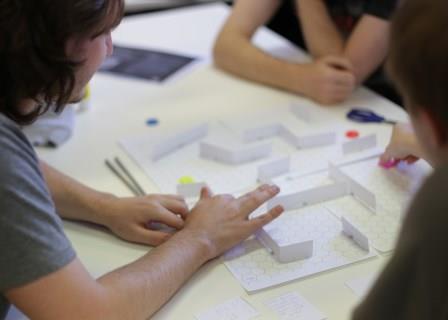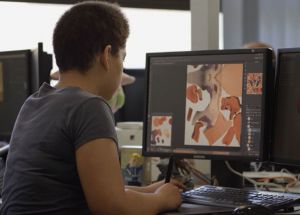
Not all business initiators have a business degree and start-up capital on-hand when they want to launch a venture. By providing basic business knowledge, working space and contacts to potential investors, incubators help to fill this gap.
While incubators can't replace the drive and commitment needed to get a start-up off the ground, they can provide the kind of environment that accelerates growth. We spoke to Sebastian Perri the Incubator Facilitator at the Canberra Campus of the Academy of Interactive Entertainment (AIE) about the role the AIE incubator program plays in supporting innovation.
In this 3-part series we will look at the AIE's approach to incubation, what makes it different from other incubators and in part 3 its future plans to create and innovative hub of learning and job creation in Watson.
PART ONE:
Why was the AIE incubator established?
As an industry leader, AIE wants to go beyond providing digital media training in Australia. We want to continue to help our graduates achieve their dreams of creating world-class content and the AIE Incubator programs makes it possible.
AIE's Incubator Program addresses the gaps between what it takes to create digital games and film and the skills and knowledge required to be a successful independent studio. Students undertaking the Graduate Diploma of Management (Learning) learn business planning, product development, marketing, and publishing and community engagement.
It's important to note that the AIE does not gain any revenues from the businesses it helps create through the AIE Incubator program, nor own a start-up's intellectual property once they leave the program. The aim of our program is to assist the very best of our graduates in building businesses that will create jobs for all Australians.
Participants are mentored through the process of setting up and operating their independent games business, delivered by industry leaders and teachers.
How big is the video game industry in Australia and what opportunities are there for graduates?
How do you future proof your graduates?
In 2014 annual sales across the Australian games industry increased by 20% at $2.46 billion. This includes Software and hardware. Software sales in Australia = 1.248 Billion. The Australian video games industry currently employs 1,300 people and growing according to Kotaku.
AIE teaches game development with a focus on innovative games design and trains students in the field of digital special effects. Both fields of study, push students to understand cutting edge technology and in some cases improve on the cutting edge.
Graduates develop their skills within a discipline of art, programming or design to a very high standard. These skills are fundamentally to do with developing high quality innovative digital products.
The skills they develop whilst at AIE can be transferred to other industries requiring high quality interactive digital products including simulation, mining and defence. A detailed list of AIE Graduate Pathways can be found on the AIE website.
Students are also introduced to local national and international developers during their time at AIE. Industry Veterans have the ability to guide students in a huge number of ways, local Industry Veterans become a part of the student's professional network through local Industry meet ups sponsored by AIE. These opportunities provide students and graduates with a support network during and after training.
Students are encouraged to make lots of games, animations and digital products while studying at AIE and are encouraged to go beyond the curriculum. For example, AIE runs 48 hour film and game jams throughout the year to reinforce a number of fundamental lessons that will last in any career:
- Scope ideas to fit the resource and time budget
- Cut hard and cut early or fail fast
- Prototype everything – design, develop, test, analyse & repeat
- Working with others under pressure
- Networking with students of different skills sets leads to strong teams of emerging developers
What do you think the role of an incubator should be?
Incubators need to allow teams to fail safely and quickly and remove as many barriers to market and lower as much financial risk as possible.
Importantly, AIE's incubator provides an environment where teams can learn from each other, industry veterans and mentors.
AIE is providing a 2 to 3 year heavily subsidised program that allows teams to establish a business and develop their first commercial product with no strings attached. AIE enables teams to sell their products, keep all of their revenue and profits, to ultimately become a sustainable business.
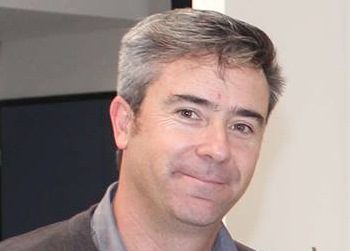 Sebastian Perri, Incubator Facilitator - Canberra Campus, Academy of Interactive Entertainment (AIE)AIE Incubator assists start-ups to get their validated commercially viable products to market by ensuring teams:
Sebastian Perri, Incubator Facilitator - Canberra Campus, Academy of Interactive Entertainment (AIE)AIE Incubator assists start-ups to get their validated commercially viable products to market by ensuring teams:
- Have significant financial support for their businesses and products with "no strings attached".
- Prepare for the challenges that need to be overcome and have a range of support throughout the challenges.
- Develop their own realistic detailed schedules based on realistic validated goals.
- Research, Prototype and test products to validate the products to ensure the best chance of commercial success.
- Have a clear plan for commercialisation and pathways to the market.
- Are funded to exhibit their products at international, national and local trade shows.
- Develop links to industry peers and local development communities for feedback, mentoring and ongoing support beyond the program.
Sebastian will be speaking about the AIE's Incubator at the Festival of Ambitious Ideas on the Thursday 30 July. This year's festival will focus on the theme 'the future of work' and speakers will discuss how their businesses or innovative projects have harnessed opportunities based on the following drivers of change: flexible Work, sustainability, science, technology and machine capabilities, globalisation, connectivity, collaborative technologies and the role of education and learning in preparing the next generation for the future of work.
PART TWO:
Continuing our series on the role of incubators in supporting entrepreneurship, we resume our conversation with Sebastian Perri the Incubator Facilitator at the Canberra Campus of the Academy of Interactive Entertainment (AIE).
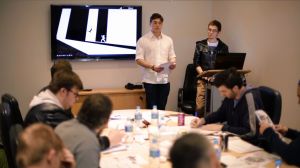
The AIE Incubator's main significant point of difference is, start-up teams will ultimately own 100% of their IP.
AIE's Incubator encourages teams to seek commercial outcomes for the projects, any returns they keep along, with any IP that they have created after the 1st year of the program. All AIE asks in return is that the teams innovate when developing their content and to credit AIE for the support and assistance provided in the products developed.
AIE's Incubator is replicated across the campuses in Melbourne, Sydney and Canberra with Adelaide Incubator starting in 2017.
All Incubator students that apply for assistance are each offered the following:
- A Business Development Scholarship cash grant of $3,000 which can be used towards whatever is needed to make their business a success. It could be a specialist game engine, rendering technology, server, hiring contract staff, drafting agreements or marketing their game online.
- Conference Travel Scholarship grant of approximately $4,500, giving AIE students the opportunity to research and learn from existing innovators; network and identify emerging opportunities. Typically this scholarship is used to cover the cost of transport, accommodation and entry to a major industry conference such as PAX Prime (Seattle, USA), Game Connection (France), Sundance (Utah, USA) or SPAA Conference (Australia).
- Industry Mentorship coordinated by experienced industry and well connected professionals. Whether it is a game designer, marketing guru, accountant or writer, our Incubator Coordinators and industry Producer help to assist AIE students with what they need to commercialise their venture.
- Studio premises and equipment is also generously provided at no cost. Students form into start-up companies which can access rent-free office space 24 hours / 7 days per week. They are provided their own dedicated desk and computer full of industry leading software to craft their products. Some examples of what is provided are meeting room, printers, access to development kits such as iPhones, iPads and other hardware and software such as Unity Development kits.
After the 12 month intensive AIE Incubator Program, some of the companies established may wish to continue down the journey of independence, wealth and job creation. The AIE is there to continue the journey with them and for those companies it provides them access to further support in the form of a Post Incubator Program (PIP) which provides further industry assistance grants on a competitive basis.
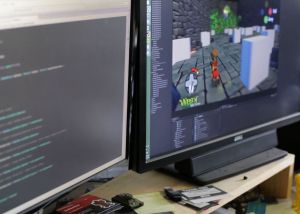
AIE's Post-Incubator Program (PIP) Development Grant makes available a total of $150,000 in non-repayable grants for games, screen and innovative digital media projects as well as the continuation of free access to 24/7 office space and dedicated desks and computers full of industry leading software to craft their products.
The aim of the grant is to support the teams coming out of AIE's Incubator Program to ensure that great ideas and quality projects make it to market. Projects that receive funding retain all ownership of their project including IP and revenue.
Post-Incubator Development Grants provide funding for individual projects that have the potential to be commercialised within 12 months, the companies have developed while in the AIE Incubator program a product prototype with demonstrable core game mechanics, features and key games aesthetics; or if a screen-based project, have completed pre-production, and can show sample footage that demonstrates the quality of the final product.
Applications are assessed based on the strength of a team's project and supporting documentation. Typically these grants have been used to showcase work at major games events such as PAX Prime Seattle, USA, PAX Australia, Vivid, Supernova, EB Games Expo and iFEST and seek distribution and publishing deals, thereby further increasing that business chance of commercial success. Further information on the PIP Grants is available here.
The Incubator offset table below attempts to describe the estimated value of the support provided by AIE's Incubator over a 1 year, 2 year and 3 year period. Year 2 and 3 estimates are based on an average team size of 4 graduates:
| Item: | Yr1 (Per Graduate): | Yr1 plus Yr2 (Per Average Team of 4): | Yr1 plus Yr2&3 (Per Average Team of 4): |
| Computers | $1,000 | $4,000 | $4,000 |
| Software | $1,000 | $8,000 | $16,000 |
| Office Space | $1,000 | $8,000 | $16,000 |
| Scholarships | $7,500 | $30,000 | $30,000 |
| Insurance | $1,000 | ||
| PIP Grants | $30,000 | $30,000 | |
| Totals | $11,000 | $50,000 to $80,000 | $64,000 to $94,000 |
Sebastian will be speaking about the AIE's Incubator at the Festival of Ambitious Ideas on the 30th July. This year's festival will focus on the theme 'the future of work' and speakers will discuss how their businesses or innovative projects have harnessed opportunities based on the following drivers of change: flexible Work, sustainability, science, technology and machine capabilities, globalisation, connectivity, collaborative technologies and the role of education and learning in preparing the next generation for the future of work.
PART THREE:
Continuing our series on the role of incubators in supporting entrepreneurship, we resume our conversation with Sebastian Perri the Incubator Facilitator at the Canberra Campus of the Academy of Interactive Entertainment (AIE).
Canberra is looking to launch a general business incubator this year. The AIE has been successfully running its incubator for a few years now. Can you share any lessons learned or pitfalls to avoid?
Before starting:
"Before the incubator starts", is the most important stage in my opinion:
- Take time to set the teams up before the start. Make sure the team has demonstrated that they can and want to work together.
- Ensure that the team has realistic unanimous goals which fit within the skills sets of the team members. Encouraging all teams to work to their strengths and passions. This is a great way to identify potential goals for potential products.
- Make sure each team is aware of the cost of their goals in terms of time and effort. Translating this into a dollar figure at the beginning provides a solid reality check.
- Be very clear with what you are offering to the candidates. Try to avoid changes once it has started as sudden changes can be extremely disruptive.
During:
- Set realistic targets for the teams and allow the teams to figure out when to launch the products without compromising their ability to do so.
- Guest speakers and industry experts are excellent – however, allow the teams development time also. Having the same guest return to ensure teams have responded to the guest feedback is worthwhile.
- Provide safe networking environments where sharing of knowledge is encouraged and rewarded.
- Provide opportunities for the teams to innovate.
- Develop iteratively; maintain a solid working version of the product at least each week, even better if it is every day.
After:
- Assist teams to maintain momentum beyond the program, AIE provides teams up to 2 years of support through Post Incubator Program Grants, heavily subsidised rent, high end software and free high speed internet.
- Help teams establish ongoing networks of likeminded individuals to enable teams to exit and remain supported. I maintain contact with the teams through social media and regular monthly meetings; this facilitates knowledge sharing and opportunities to provide further support options.
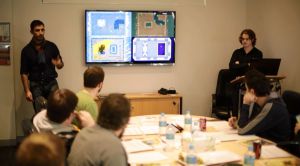
The first 3 years hovered at around 50 to 60 graduates.
In 2015 we have 80 enrolled in the program, a 25% increase on previous years. All candidates thinking about joining AIE's incubator are aware of opportunities and challenges to commercialise their products before they start. This is thanks to the 2 years of training they receive prior to joining AIE's Incubator.
The legacy of previous teams acts as inspiration for new candidates and helps people understand what to focus their time and energy on.
It can also act as a reality check and help candidates decide if it is the right option for them or not.
Another contributing factor to the increase in numbers is we are seeing a small number of graduates return to join the incubator after being in the digital industry for a few years to take the opportunity to launch their own digital business.
What are the future plans for the AIE Incubator? Do you think a traditional approach still works?
Near future – in 2015 it is expected that the 8 teams from AIE's incubator already accepted as Steam developers will reach their first sustainability target through the release and sale of their games. All teams will be entering local, national and international competitions to further build commercial and critical success.
It is expected that these teams will continue to co-locate with AIE's campuses, growing the digital industry within and around each campus. Deepening the fabric of AIE's community and enriching the lives of students and graduates through knowledge sharing, employment opportunities and business start-up mentoring.
Long Term Future Plans
The AIE Incubator is a fundamental component of AIE's future long term plans both nationally and in Canberra.
In Canberra, the AIE, is submitting to government a detailed business case and draft 20 year master plan to refurbish Canberra Technology Park (CTP) and develop the AIE Canberra Campus into an innovative hub of learning and job creation that includes student accommodation. To support the AIE Incubator and Post Incubator Program, AIE will develop new office space for up to 200 graduates and launch a co-working space for 80 FTE in game and film production.
The Watson campus of the AIE can be the backbone of the emerging Watson Education Precinct and business incubation leading to real jobs being created will be a growing outcome of the development. Students will have the ability to study, work and live on campus.
If the proposal goes ahead, AIE will invest up to $44 million on new Student Accommodation, CTP building refurbishments and community facilities as part of the master plan.
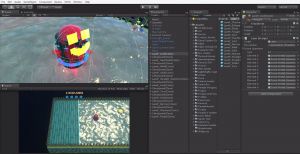
- Graduating students will become part of a new ecosystem for innovation which will see the games, animation and film industry in Canberra flourish.
- Momentum for incubated companies will grow through collaboration and pooling of shared resources.
- Incubated companies will have greater potential to attract like-minded partners and investor groups.
- AIE will be investing funds into a range of activities that the AIE believes will help position the ACT as an innovative leader in the creative industries sector, including:
- Incubators, accelerators and other enterprise creation programs
- Grants programs for incubator and accelerator teams
- Affordable student accommodation
- New building constructions (e.g. Production Offices, Cafeteria, Extensions to current building)
- Refurbishments to existing spaces (e.g. Hall Conversion to Green Screen Facility)
- Watson Community Facilities (e.g. parks, gardens & recreational facilities)
- Landscaping
- Site Services Upgrades
- Parking
AIE is also exploring opportunities in other states that will give AIE Incubator teams the best chance of success.
Incubators and Accelerators
I personally feel that incubators and accelerators are different and I believe that incubation is best placed first for those teams that have not run a business before and want to get started. Accelerators are best placed to enable teams with business experience to accelerate and scale up a business idea that already has traction. Incubators can feed accelerators and are linked both forming an important part of any entrepreneurial ecosystem.
Sebastian will be speaking about the AIE's Incubator at the Festival of Ambitious Ideas on the 30th July. This year's festival will focus on the theme 'the future of work' and speakers will discuss how their businesses or innovative projects have harnessed opportunities based on the following drivers of change: flexible Work, sustainability, science, technology and machine capabilities, globalisation, connectivity, collaborative technologies and the role of education and learning in preparing the next generation for the future of work.
About Lighthouse Business Innovation Centre
Lighthouse has a strong track record of supporting entrepreneurs, researchers and inventers on the path from concept to commercialisation. Since July 2008, Lighthouse has worked with over 990 distinct enterprises and provided group and peer based services to over 3400 enterprises and individuals. For over five years Lighthouse has successfully delivered business advice, education, mentorship and networking opportunities to help these businesses commercialise their ideas and grow their companies. Lighthouse also delivers programs such as the ACT Microcredit Program for the ACT Government. Visit www.lighthouseinnovation.com.au for more information.


